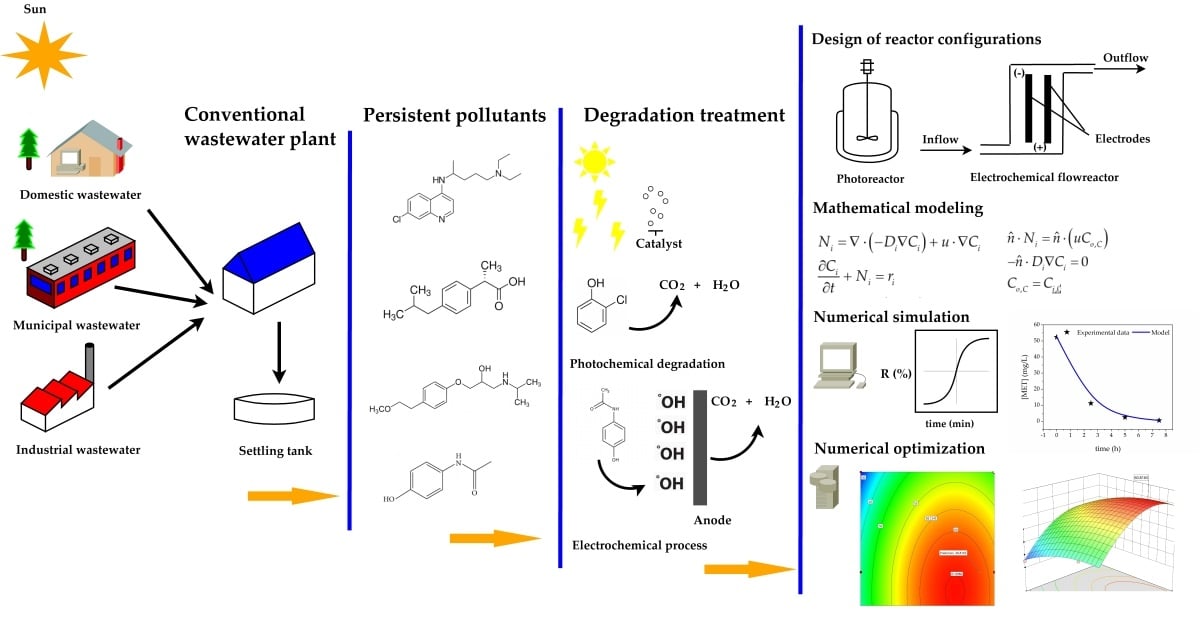- 2.8Impact Factor
- 5.5CiteScore
- 15 daysTime to First Decision
Design and Numerical Simulation of Photo- and Electrochemical Degradation of Pollutants
This special issue belongs to the section “Chemical Processes and Systems“.
Special Issue Information
Dear Colleagues,
The modeling, simulation, and numerical optimization of photo- and electrochemical processes are critical research areas because of the growing need for effective, environmentally friendly, safe, and sustainable wastewater treatment methods. These powerful tools can efficiently design, optimize, and scale-up new technologies to promote water and sanitation cleanliness.
This Special Issue will present novel reactor design and assessment configurations, as well as the modeling, simulation, and numerical optimization of pollutant photo- and electrochemical degradation. It will also cover mathematical modeling and simulation tools that help predict and optimize environmental reaction conditions. Therefore, this Special Issue is welcoming original research and review articles related to the following areas of the photo- and electrochemical degradation of pollutants:
- Mathematical modeling development;
- Numerical solutions;
- Numerical optimization, such as response surface methodology and convex and non-convex optimization;
- CFD simulations;
- Linear and non-linear control.
We hope that this Special Issue will provide new and valuable insights into these powerful tools.
Prof. Dr. Alejandro Regalado-Méndez
Prof. Dr. Ever Peralta Reyes
Guest Editors
Manuscript Submission Information
Manuscripts should be submitted online at www.mdpi.com by registering and logging in to this website. Once you are registered, click here to go to the submission form. Manuscripts can be submitted until the deadline. All submissions that pass pre-check are peer-reviewed. Accepted papers will be published continuously in the journal (as soon as accepted) and will be listed together on the special issue website. Research articles, review articles as well as short communications are invited. For planned papers, a title and short abstract (about 250 words) can be sent to the Editorial Office for assessment.
Submitted manuscripts should not have been published previously, nor be under consideration for publication elsewhere (except conference proceedings papers). All manuscripts are thoroughly refereed through a single-blind peer-review process. A guide for authors and other relevant information for submission of manuscripts is available on the Instructions for Authors page. Processes is an international peer-reviewed open access semimonthly journal published by MDPI.
Please visit the Instructions for Authors page before submitting a manuscript. The Article Processing Charge (APC) for publication in this open access journal is 2400 CHF (Swiss Francs). Submitted papers should be well formatted and use good English. Authors may use MDPI's English editing service prior to publication or during author revisions.
Keywords
- design of photo- and electrochemical reactors
- numerical solution
- mathematical modeling
- numerical optimization
- pollutants
- process control

Benefits of Publishing in a Special Issue
- Ease of navigation: Grouping papers by topic helps scholars navigate broad scope journals more efficiently.
- Greater discoverability: Special Issues support the reach and impact of scientific research. Articles in Special Issues are more discoverable and cited more frequently.
- Expansion of research network: Special Issues facilitate connections among authors, fostering scientific collaborations.
- External promotion: Articles in Special Issues are often promoted through the journal's social media, increasing their visibility.
- Reprint: MDPI Books provides the opportunity to republish successful Special Issues in book format, both online and in print.


